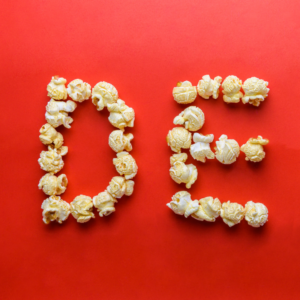Let’s continue our exploration of the serious and lighter sides of organising with a wander through the alphabet with The A to Z of Organising.
You can catch up on A is for here, B is for here, C is for here.
 And now we’ll look at D and E.
And now we’ll look at D and E.
Declutter – To remove clutter. Yes, it is as simple as that. One part of the organising process, not the whole part.
Delegate – A useful strategy to get things done by the right person for the job. When you delegate successfully, it results in the right tasks getting done by the right people, leaving you time and energy to do the things you’re best at. In fact, it is my favourite D word, and I can often be heard to say, “D is for Delegate”.
Desk – The command centre of the home, office or place of learning. When working at your desk, you should be able to lay your hands on the tools you need without leaving your seat. And there should be nothing irrelevant to your desk work getting in the way of your productivity. To make tidying your desk more fun, check out this article from the archives – 10 Things To Do While You Tidy Your Desk.
Dining Table – Table used for dining. Also used for family board games, jigsaw puzzling, sewing or crafting, long friendly discussions about politics, religion or sex. However, the dining table with its large flat surface often becomes a catchall space for delayed decisions. Those delayed decisions might look like shopping that’s not been put away or piles of papers to be sorted/read/put away/tossed. To stop your dining table from becoming a magnet for clutter, make it beautiful instead. Sophie Kost from My Beautiful Abode has some inspo for you in her Swoon worthy dining tables post.
Donations – An excellent way to share the love and mindfully declutter unwanted items. You can donate everything from baby supplies and beauty products to technology and textiles. But please don’t cast off rubbish in the guise of donations. It’s not good karma.
Downsizing – The act of intentionally moving into smaller premises, often but not always, when the family unit has become smaller. Leaving a large family home and moving into a smaller home, whether it’s a house, an apartment, or a tiny house, forces big decisions. How many dinner sets to keep? What will fit and what will be useful? Downsizing is sometimes referred to as “rightsizing” by people who believe that “down” is a downer. As someone who has downsized from a large family into a small apartment, let me tell you, it is no downer. It is liberating.
Drawers – An efficient way of storing items for easy retrieval. A drawer can turn deep impractical pantry shelf into a functional and accessible storage resource. Drawers can be retrofitted, or you can create your own. A straight-sided basket, plastic container or cardboard box can become a handy drawer.
Energy – Some things fill you up and some things drain your energy. Knowing the difference and choosing to let go of, or at least minimise, anything that drains you of energy is good self-care. There’s also the concept of “return on energy”, akin to “return on investment”. What tasks take more energy than they are worth? Get rid of, or minimise, those. See Delegate above.
Essentials – When I speak to a group of people about organising, I sometimes invite them to do a little exercise that goes like this… Imagine you are going to live on an island for a year. Your shelter and food and water are taken care of. You can only take 10 things with you. What are they? The answers are different for everyone, and they range from books to a pillow to a toothbrush. What’s essential for health and well-being is different for everyone. What are your essentials?
Evaluate – Part of the decluttering and organising process is to evaluate – your things, your tasks, your use of time and space. Sounds simple, right? But the process of evaluation is complex. Human beings are complex. When we evaluate, we engage our brains as well as our hearts. Our upbringing and our life experiences influence our evaluations. Years of negative self-talk or criticism by others affect our confidence in our own wisdom. Aah! This is one reason many people find the neutral and non-judgemental assistance of a professional organiser in decluttering and organising so valuable.



